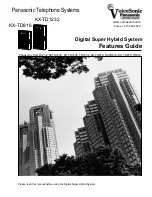
UC Series User Manual
82
OpenVox Communication Co. , LTD.
URL: www.openvox.cn
Restrictions
user. Any Follow-Me or Call Forward states active on the extension will result in the queue
call following these call paths. This behavior has been the standard queue behavior on past
FreePBX versions.
When set to ‘No Follow-Me or Call Forward’, all agents that are extensions on the system will
be limited to ring their extensions only. Follow-Me and Call Forward settings will be ignored.
Any other agent will be called as dialed. This behavior is similar to how extensions are dialed
in ringgroups
When set to ‘Extensions Only’ the queue will dial Extensions as described for ‘No Follow –
Me or Call Forward’. Any other number entered for an agent that is NOT a valid extension
will be ignored. No error checking is provided when entering a static agent or when logging on
as a dynamic agent, the call will simply be blocked when the queue tries to call it. For dynamic
agents, see the ‘Agent Regex filter’ to provide some validation.
General Queue Options
Ring Strategy
Ringall
: ring all available agents until one answers (default)
Leastrecent:
ring agent which was least recently called by this queue
Fewestcalls:
ring the agent with fewest completed calls from this queue
Random:
ring random agent
Rrmemory: round robin with memory, remember where we left off last ring pass
Rrordered:
same as rrmemory, except the queue member where order from config file is
preserved
Linear:
rings agents in the order specified, for dynamic agents in the order they logged in
Wrandom:
random using the member’s penalty as a weighting factor, see asterisk
documentation for specifics.
Autofill
Starting with Asterisk 1.4, if this is checked, and multiple agents are available, Asterisk will
send one call to each waiting agent(depending on the ring strategy). Otherwise, it will hold all
calls while it tries to find an agent for the top call in the queue making other calls wait. This
was the behavior in Asterisk 1.2 and has no effect in 1.2. See Asterisk documentation for more
details of this feature.
Skip Busy Agents
When set to 'Yes' agents who are on an occupied phone will be skipped as if the line were
returning busy. This means that Call Waiting or multi-line phones will not be presented with
the call and in the various hunt style ring strategies, the next agent will be attempted.
When set to 'Yes + (ringinuse=no)' the queue configuration flag 'ringinuse=no' is set for this
queue in addition to the phone's device status being monitored. This results in the queue
tracking remote agents (agents who are a remote PSTN phone, called through Follow-Me, and
other means) as well as PBX connected agents, so the queue will not attempt to send another
call if they are already on a call from any queue.
When set to 'Queue calls only (ringinuse=no)' the queue configuration flag 'ringinuse=no' is set
for this queue also but the device status of locally connected agents is not monitored. The
behavior is to limit an agent belonging to one or more queues to a single queue call. If they are
occupied from other calls, such as outbound calls they initiated, the queue will consider them
available and ring them since the device state is not monitored with this option.
WARNING: When using the settings that set the 'ringinuse=no' flag, there is a NEGATIVE
side effect. An agent who transfers a queue call will remain unavailable by any queue until that

































